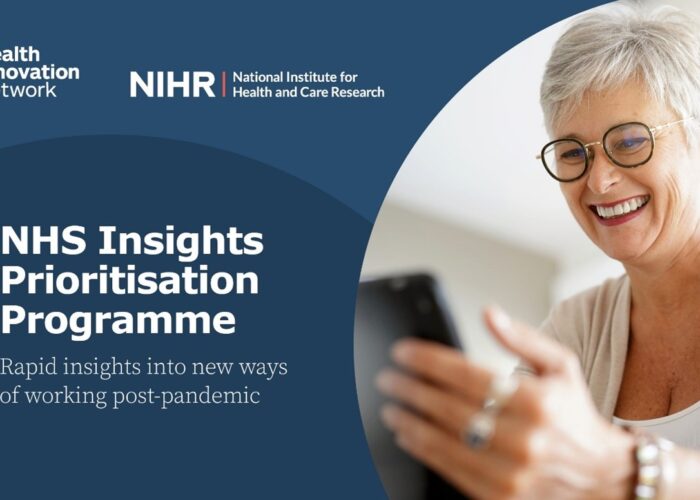 Having recently attended an NHS-delivered agile project management course, Sara Sekelj, Data Analyst, explains how collaborating with other NHS organisations can help inspire smarter working.
Having recently attended an NHS-delivered agile project management course, Sara Sekelj, Data Analyst, explains how collaborating with other NHS organisations can help inspire smarter working.
At ICHP we collaborate with a variety of NHS organisations and other partners on many different projects, using several methods of project management. Our work is very varied and the type of project management we use depends on the type of project we are working on. By working with NHS partners and learning how they use project management in their own work, we can better understand their daily practises and inform our own.
We recently had the opportunity to attend a one-day training course at ICHP delivered by Ella Worsdale, Head of Information, and Lucy Tiffany, Greater Manchester Business Intelligence Lead at Pennine Care NHS Foundation Trust, on agile project management (agile). The course gave ICHP team members, with and without previous agile training, the chance to hear how agile has improved project delivery within the NHS.
What is agile project management?
Agile is about delivering the best possible value, not the maximum possible value, using an approach that is iterative, adaptable, rapid, cooperative and quality driven. By using an iterative process, people work together and communicate well, rather than working in isolation. Lucy and Ella trained us in the ‘scrum’ method of agile, which sees a project delivered in incremental builds of two to three weeks, known as ‘sprints’. At the end of each sprint, the project team and the customer review the progress so far and can adapt and develop the project depending on how things are working.
Training in a relatable way
Ella and Lucy implemented agile working at Pennine Care NHS Foundation Trust (NHSFT), some years ago to streamline their processes within the information team and then the wider organisation, facilitating communication and inspiring best practise working.
Having both attended agile project management courses themselves, Ella and Lucy developed their training day for staff within their organisation and, following its success, kindly agreed to share their practises with us at ICHP.
Ella and Lucy delivered training that was interactive and engaging, making the theory relatable by using real-life examples such as building a house extension to recognise the steps in the methodology, to tasking us with making paper aeroplanes to understand the importance of asking the right questions.
Lucy explained: “It’s important to understand requirements capturing at the beginning of a project to ensure you know what the client wants, why they want it, how they want it, and what they expect it to look like. We also need to ask the right questions for scoping out the requirements, including the ‘five whys’. By asking ‘why?’ repetitively, we can dig down deep to understand the root cause of a problem, so the whole team can understand how we are moving forward.”
Later in the day we worked in teams to build Lego villages, putting the scrum methodology we had learned into practise. This practical and fun task saw us run our own sprints with Lucy and Ella acting as the clients to ensure the project product – the Lego village – fulfilled their requirements. [Include a Lego village picture here.]
Why collaborating makes sense
A number of staff from across ICHP were involved in the training to learn how other NHS organisations tackle project management in their working environment.
Christine Norman from the innovation delivery team, attended the course, and said: “It’s been really good to have a team from another NHS organisation talk to us about how they have been practising, developing and enhancing project delivery. It’s important to identify the right approach for the right project and think about how we can take principles and adapt them to suit the type of work that we’re doing. Discussing how that works with Lucy and Ella was really useful.”
Agile working is already being incorporated into scoping for projects across ICHP. Christine told me: “The training complemented our existing thinking about which project management approaches we use for which project. In an upcoming project where we will be supporting a trust, it will be suitable to use some of the agile methodology to work in a flexible way using fortnightly sprints. By agreeing the desired products at the beginning of each sprint, we will be able to undertake key workstream deliverables for the trust.”
Sharing learning and working in collaboration is important to ICHP as it is key to helping the NHS work more efficiently. As Lucy said: “I’m really passionate about spreading the word and getting more people working in an agile way, however it fits in their organisation. It’s a future-motivated methodology that is very productive, and it can be beneficial to both the organisation and the individual people working within it. It changed the way we work at Pennine Care NHSFT quite dramatically, so by sharing what works and learning from each other, we hope to help evolve NHS practices.”
To find out how you can collaborate with ICHP, please contact Sara Sekelj on sara.sekelj@imperialcollegehealthpartners.com or 07944 395054.



